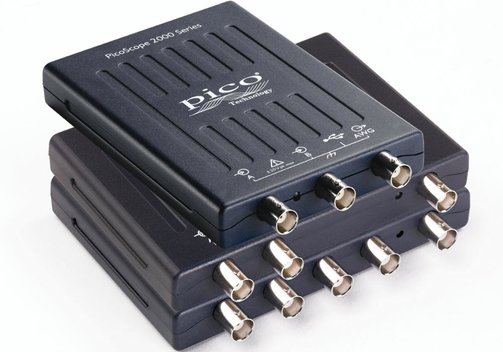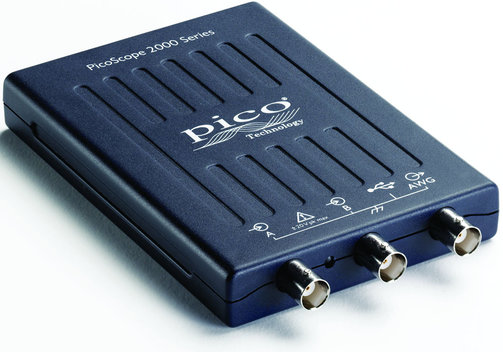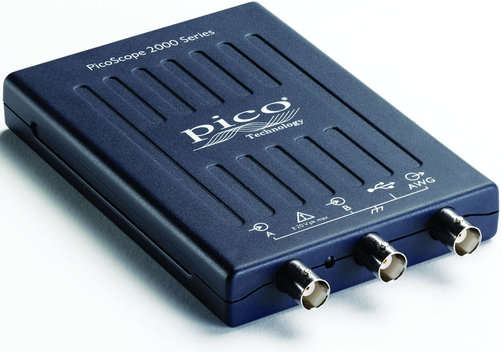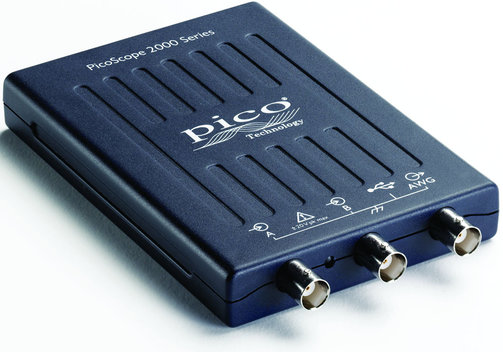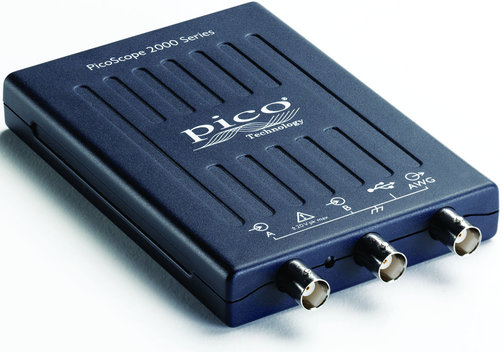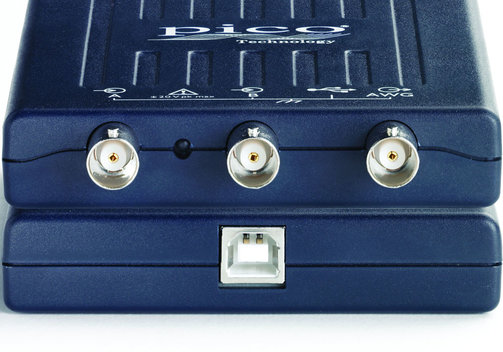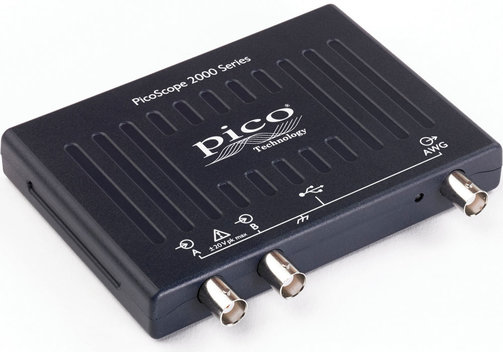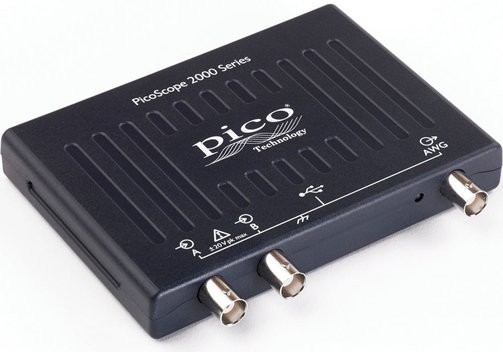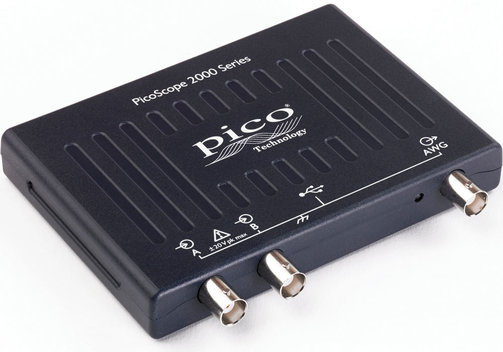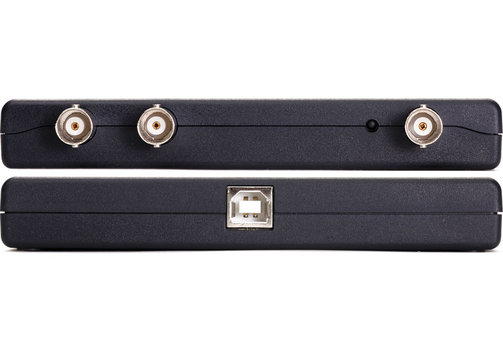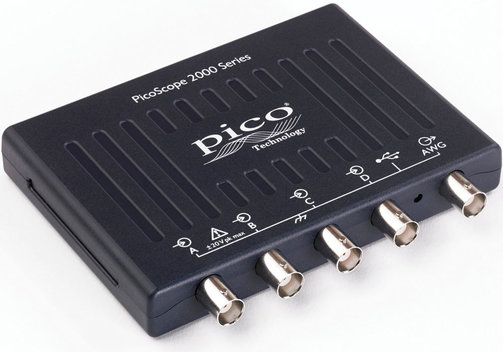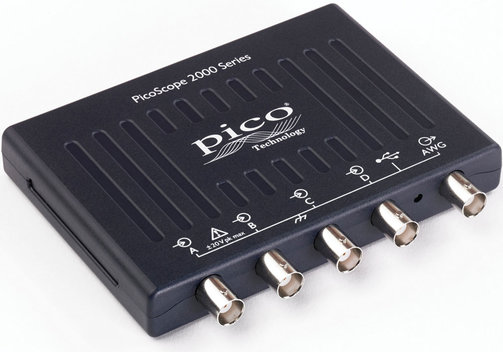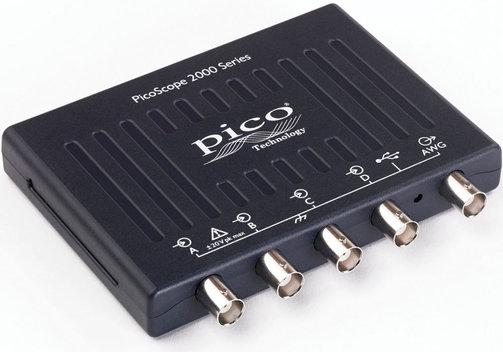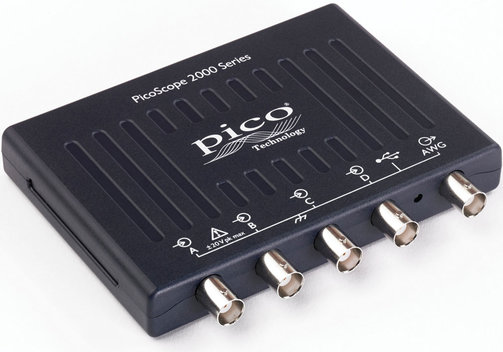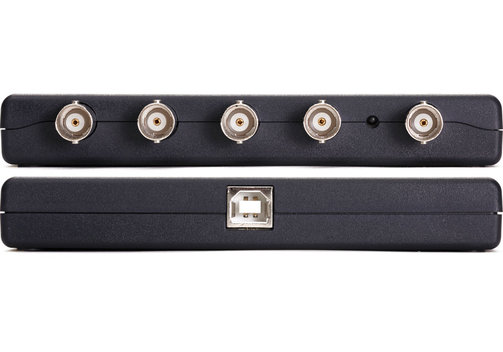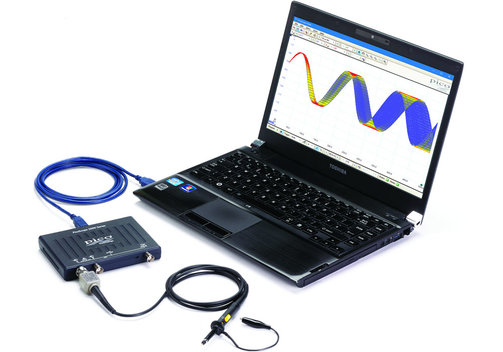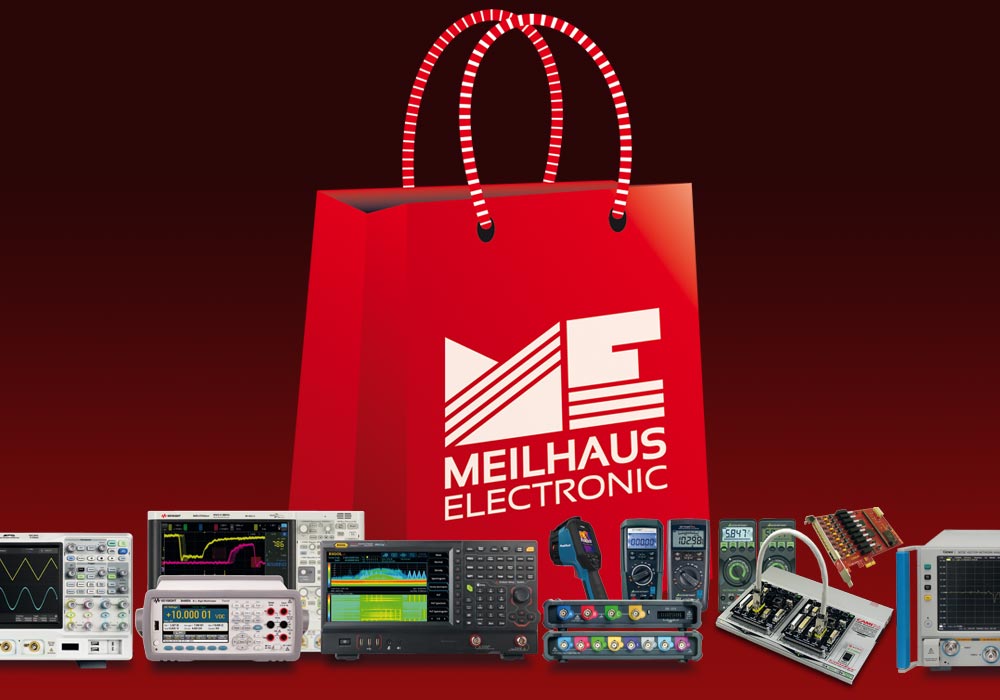PicoScope 2000 Series USB PC Compact Oscilloscope, 2/4 channels, up to 100MHz
Benefits of the PicoScope PS2000 Series - Like a Benchtop Oscilloscope, Only Much More Compact!
- Low-cost USB PC oscilloscopes for education, beginners or high volumes as embedded scope.
- 2 or 4 channels with bandwidths up to 100 MHz.
- Memory depth up to 128 MS.
PicoScope2000 Series USB PC Compact Oscilloscope, 2/4 channels, up to 100 MHz
Models PicoScope PS2204A, PS2205A, PS2206B, PS2207B, PS2208B, PS2405A, PS2406B, PS2407B, PS2408B
The PicoScope 2000 series offers affordable, super-compact 2 and 4-channel USB PC oscilloscopes with bandwidths from 10 to 100 MHz and a max. sample rates from 100 MS to 1 GS/s. The oscilloscopes are the modern alternative to bulky desktop devices and, thanks to their attractive price/performance ratio and compact design, they are suitable for hobby and education as well as for large quantities in industry as embedded devices. The proven ▸PicoScope7 software is packed with professional features such as maths, statistics, automatic measurements, advanced triggering, mask testing or serial bus decoding.
- 2 or 4 analog channels.
- 10, 25, 50, 70, or 100 MHz bandwidth.
- 100, 200, 500 MS/s, or 1 GS/s max. sampling rate (1 channel).
- Memory depth, depending on model, between 8 kS/s and 128 MS.
- Function generator/signal generator and arbitrary waveform generator/AWG included, bandwidth, depending on model, 100 kHz or 1 MHz.
- Incl. the versatile ▸PicoScope7 software for Windows, Linux, Mac, as well as the SDK/software developer kit for programmers/developers:
- Versatile mathematics, statistics, automatic measurement and advanced triggering included.
- Mask testing included.
- Serial bus-decoding included for various protocols, including 1-Wire, ARINC429, CAN/CAN-FD, BroadR-Reach (100BASE-T1), DALI, DCC, DMX512, Ethernet 10Base-T/100Base-TX, FlexRay, I²C, I²S, LIN, PS/2, Manchester, MODBUS, SENT, SPI, UART (RS232/RS422/RS485), USB 1.1.
- Spectrum analyzer function included.
- All models for USB 2.0.
- USB-powered.
Model Overview
| Model | PicoScope 2204A | PicoScope 2205A | PicoScope 2206B | PicoScope 2207B | PicoScope 2208B | PicoScope 2405A | PicoScope 2406B | PicoScope 2407B | PicoScope 2408B | |
| PP906/PP917* | PP907/PP966* | PQ012 | PQ013 | PQ014 | PQ015 | PQ016 | PQ017 | PQ018 | ||
| Channels | Analog | 2 | 2 | 2 | 2 | 2 | 4 | 4 | 4 | 4 |
| Digital | - | - | - | - | - | - | - | - | - | |
| Bandwidth | 10 MHz | 25 MHz | 50 MHz | 70 MHz | 100 MHz | 25 MHz | 50 MHz | 70 MHz | 100 MHz | |
| Sample rate | 1 channel | 100 MS/s | 200 MS/s | 500 MS/s | 1 GS/s | 1 GS/s | 500 MS/s | 1 GS/s | 1 GS/s | 1 GS/s |
| 2 channels | 50 MS/s | 100 MS/s | 250 MS/s | 500 MS/s | 500 MS/s | 250 MS/s | 500 MS/s | 500 MS/s | 500 MS/s | |
| Other combinations | - | - | - | - | - | 125 MS/s | 250 MS/s | 250 MS/s | 250 MS/s | |
| ETS/equivalent, 8 bit | 2 GS/s | 4 GS/s | 5 GS/s | 10 GS/s | 10 GS/s | 5 GS/s | 10 GS/s | 10 GS/s | 10 GS/s | |
| Memory depth | 8 kS | 16 kS | 32 MS | 64 MS | 128 MS | 48 MS | 32 MS | 64 MS | 128 MS | |
| Resolution | 8 bit | |||||||||
| Serial decoding | Supports a variety of protocols, including 1-Wire, ARINC 429, CAN, CAN FD, DALI, DCC, DMX512, Ethernet 10Base-T and 100Base-TX, BroadR-Reach/Ethernet 100Base-T1, FlexRay, I²C, I²S, LIN, Manchester, PS/2, MODBUS, SENT, SPI, UART (RS232/RS422/RS485), USB 1.1 | |||||||||
| More features | Spectrum analyzer (DC to scope bandwidth), math channels, automatic measurements, mask limit test, advanced trigger | |||||||||
| Signal generator | Sine, square, triangle, DC, ramp, sinc, Gauß, halfsine; models B additional white noise, PRBS | |||||||||
| Models 2204/2205A: DC...100 kHz; AWG 1,548 MHz update rate, 12 bit, 4 kS buffer; models 2405A/2405A MSO: DC...1 MHz; AWG 20 MHz update rate, 12 bit, 8 kS buffer | ||||||||||
| Models B: DC...1 MHz; AWG 20 MHz update rate, 12 bit, 32 kS buffer | ||||||||||
| Interface | USB 2.0 HighSpeed | |||||||||
| Power supply | USB bus-powered | |||||||||
Included: USB oscilloscope from the PicoScope2000 series (PS 2204A, 2205A, 2206B, 2207B, 2208B, 2405A, 2406B, 2407B, or 2408B), ▸PicoScope7 software and user manual (download), USB cable, 2x or 4x x1/x10 probes - *except PP917/966 models (which come without probes).
Frequently Asked Questions:
Question: Can a device at the price of the PicoScope 2000 be a true and full oscilloscope?
Answer: All PicoScopes work with the same software, although of course some functions are hardware-dependent. Therefore, even the "small" PicoScopes are full-fledged true oscilloscopes and probably the best in their class. Of course, an oscilloscope with its technical data must always be selected to match the application, i.e. to match the signals to be analyzed. With the low-cost PicoScope 2000 model with a bandwidth of 10 MHz and sample rate of 100 MS/s, the analysis of high-frequency signals and analysis of very fine details will not be possible and/or only within the limits of the technical data. But not all applications and signals require the highest possible specifications, especially since these have a significant impact on the price. Especially for education, practical training labs (large quantities) and experiment in the private/hobbyist sector the devices are very interesting. In addition, many embedded applications have simpler requirements for the oscilloscopes, but require compact size and an interesting price for large quantities.
Question: Does the PicoScope software cost extra?
Answer: No, the software is available via free download from the manufacturer's website. Many functions can also be tried out without the scope hardware in a kind of simulation mode before purchasing the hardware. Pico Technology even offers free unlimited updates of the software.
Question: What is the difference between a bench oscilloscope and a PC oscilloscope and what are their advantages and disadvantages?
Answer: Bench-top oscilloscopes are self-contained, stand-alone measuring instruments. Accordingly, they have a front panel with knobs/keys, a display (LCD, touch screen depending on the model) and interfaces to the PC such as USB, Ethernet or GPIB. Via the interfaces, the instruments can be controlled from the PC or measurement data can be exchanged (however, this is not mandatory). Thanks to modern, highly integrated, specially developed ASIC chips, the performance and accuracy of these devices is currently increasing while prices are often falling.
The PicoScopes are embedded or PC oscilloscopes for USB. The oscilloscope module itself contains the pure measurement hardware and only works together with a PC/laptop. The software in the PC takes over a large part of the oscilloscope's tasks. So the user needs an additional PC/laptop in any case, but saves on the oscilloscope proportionally the costs for the display and the front panel.
PicoScopes are a very compact, space-saving and flexible solution. The measurement data is immediately available in the PC for further processing, analysis, transmission/e-mailing, etc. The software can be equipped with many additional functions and can easily be kept up to date by upgrades (but may to some users not have the feel of a "real" front panel with buttons).
PicoScopes are particularly suitable for space-critical and embedded applications, in test stands or when a laptop is already "in the bag" for mobile use anyway.
Information on product safety:
Manufacturer:
Pico Technology Ltd., James House, Colmworth Business Park, St Neots, Cambridgeshire, PE19 8YP/GBR
www.picotech.com
Responsible person:
Meilhaus Electronic GmbH, Am Sonnenlicht 2, 82239 Alling/DEU
info@meilhaus.com
Related Products
Customers also bought
Last seen






















